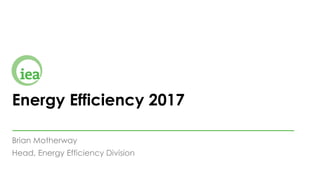
Energy Efficiency 2017: Launch Presentation
- 1. Energy Efficiency 2017 Brian Motherway Head, Energy Efficiency Division
- 2. © IEA 2017 Key messages 2016 confirmed the recent step up in global energy efficiency gains • The world is generating more value than ever from its energy use, and there has been a noticeable acceleration in recent years This is generating economic, social and environmental benefits • Energy intensity improvement is the main reason energy related emissions have levelled off • Because of energy efficiency, global energy use was 12% lower in 2016, resulting in global economic gains and significant savings for households But stronger policy implementation is essential • The global picture masks very different country performances and low rates of new policy implementation. Gains will erode quickly if the pace of policy delivery does not accelerate
- 3. © IEA 2017 Energy-related CO2 emissions have been flat since 2014 IEA analysis shows that global energy-related CO2 emissions remained flat in 2016 for the third year in a row, even though the global economy grew 5 10 15 20 25 30 35 1970 1975 1980 1985 1990 1995 2000 2005 2010 2014 2015 2016 Gt Global energy-related CO2 emissions
- 4. © IEA 2017 28 30 32 34 36 2014 emissions GDP growth Renewables and fuel mix Energy intensity 2016 emissions Emissions(BilliontonnesCO2e) Energy intensity improvement is keeping emissions down The combination of energy efficiency improvement and the move towards renewables and cleaner fuels has been key to avoiding 2 billion tonnes of additional greenhouse gas emissions Factors influencing greenhouse gas emissions, 2014-16
- 5. © IEA 2017 The world is generating more value from its energy use This decade has seen intensity improvement rates at almost double the historic average, suggesting that the world has entered a new era of faster intensity gains. Changes in global energy intensity (energy per unit of GDP) -3.0% -2.0% -1.0% 0.0% 1981-90 1991-2000 2001-10 2011 2012 2013 2014 2015 2016 Annualchangeinenergyintensity Average annual change 1981-2010 Average annual change 2011-2016
- 6. © IEA 2017 Global energy use is significantly changing Energy efficiency reduced global energy use by 12% in 2016, an amount equivalent to the energy use of the European Union. Global final energy consumption and savings from energy efficiency 0 2 000 4 000 6 000 8 000 10 000 12 000 2000 2016 Mtoe Efficiency savings
- 7. © IEA 2017 Energy consumers are making big savings Efficiency improvements made since 2000 reduced energy spending in 2016. German consumers saved nearly USD 50 billion on their annual home and travel energy costs. Per capita household energy expenditure savings in 2016 due to efficiency $60 $580 $470 $430 $370 $140 $60 Germany France United Kingdom Japan United States China Mexico 0% 10% 20% 30% 40% 50% %reductiononenegryexpenditure
- 8. © IEA 2017 24% 26% 28% 30% 32% 2016 2015 2014 2013 2012 % of global energy use covered by mandatory efficiency policies Existing policies New policies Policies of the past drive progress of today The amount of global energy use covered by mandatory efficiency policies grew in 2016, but 68% of energy use remains uncovered. We owe the efficiency gains of today to the policies of the past. Annual additions to the global policy coverage of mandatory codes and standards Existing policies New policies
- 9. © IEA 2017 Vehicle efficiency policy is two-speed Nearly 40 countries have fuel efficiency standards for cars. Only Canada, China, Japan and the United States have standards for trucks. Efficiency standard coverage by transport end-use, 2016 0% 10% 20% 30% 40% 50% 60% Cars Energyusecoveredbyfuelefficiency standards Trucks Europe Asia North America China USA Japan Canada
- 10. © IEA 2017 Demand for space cooling is heating up Space cooling is the fastest growing source of electricity demand. There is significant future cooling energy growth that has minimal policy progress today Space cooling energy use and policy progress 0% 5% 10% 15% 20% 25% 30% 35% 40% Policy progress index Australia Korea United States Japan China India Italy Indonesia Mexico Brazil 2015 energy use 2050 energy use (projected)
- 11. © IEA 2017 Concluding points • Energy Efficiency 2017 shows the critical importance of energy efficiency to economies, households and the environment. • There has been a step up in efficiency gains in recent years, despite lower energy prices, and this is having many positive impacts. • However, 68% of global energy use remains uncovered by mandatory efficiency policy and the current low rate of policy implementation needs to accelerate. • Decarbonisation requires the integration of efficiency and renewables into the energy system through a harmonised policy approach. • The IEA is attacking the unmet energy efficiency potential by facilitating knowledge sharing and providing concrete policy recommendations.
